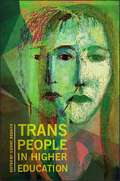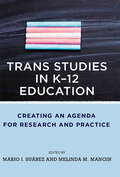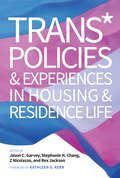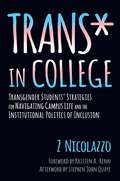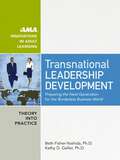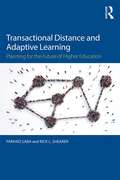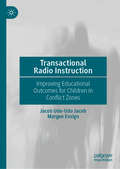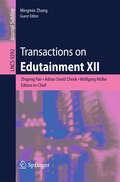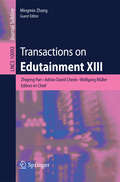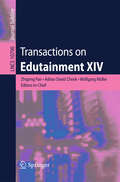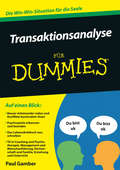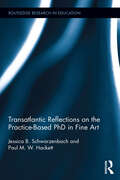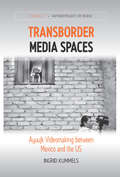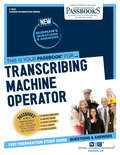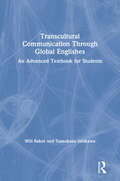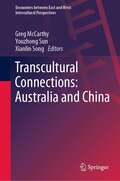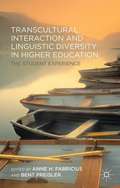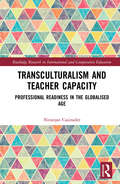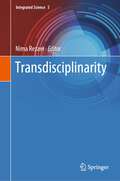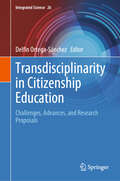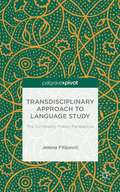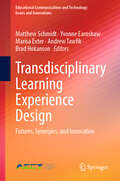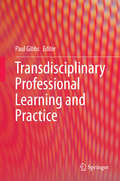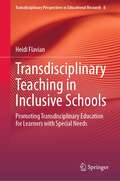- Table View
- List View
Trans People in Higher Education
by Genny BeemynHonorable Mention, 2019 Foreword INDIES Book of the Year Award in the LGBTQ categoryWhile more trans students, faculty, and staff have come out on US college campuses today than ever before, many still report enduring harassment and discrimination. Others avoid disclosing their gender identity because they do not feel safe or comfortable at their schools. This groundbreaking book is the first to address their experiences in a single volume. Genny Beemyn brings together personal narratives and original research to give readers both individual and large-scale perspectives, which provide unprecedented insight into the experiences of trans people in higher education. These contributions reveal that despite an improving environment, trans people continue to face widespread interpersonal and institutional opposition on campuses across the country.Some of the first published research focusing on nonbinary trans undergraduates and trans graduate students is included here, in addition to the most comprehensive research to date of trans students at women's colleges and of trans academics. Trans People in Higher Education also examines the sexual health of trans students, the treatment of trans people by individuals with institutional authority, and the strategies and lessons learned from one college that successfully became more trans inclusive.
Trans Studies in K-12 Education: Creating an Agenda for Research and Practice
by Mario I. Suárez Melinda ManginA vital inquiry into trans issues in education, this compelling work argues for the design of education research, policies, and environments that honor all gender experiences and identities.Edited by two prominent figures in trans studies, Mario I. Suárez and Melinda M. Mangin, Trans Studies in K–12 Education brings together scholars and professionals representing a range of academic traditions, research methodologies, and career backgrounds to explore why and how schools should affirm gender diversity and challenge gender-based inequities.The collection offers a comprehensive examination of how gender is manifested in the educational context. Gathering a wealth of evidence, the book&’s contributors expose the prevailing norm of gendered environments, which are entrenched in the very design and execution of educational research. The collection also lays out a critical overview of US laws and policies related to gender equity, gender identity, and gender expression and how these frameworks impact educational environments. These findings draw attention to deficit-oriented, pathologizing ideologies that surround nonconforming gender identities and the detrimental, often traumatizing effects on transgender students and educators.Throughout, the contributors recommend methods for establishing gender-affirming research, policy, and practice. They outline the sociopolitical and legal pathways that trans and nonbinary students and school employees may use to secure education and workplace rights. They discuss the positive gains made by professional development for teachers, LGBTQ+ advocacy, and community programs that successfully support transgender and gender-nonconforming individuals.Ultimately, the volume highlights the promise of creating K–12 education spaces that are liberating rather than constraining.
Trans* Policies & Experiences in Housing & Residence Life (An ACPA Co-Publication)
by Jason C. Garvey, Stephanie H. Chang, Z Nicolazzo, Rex Jackson, Kathleen G. KerrCo-published with What are the institutional politics associated with fostering trans* inclusive policies? When formalizing a policy, what unanticipated challenges may emerge? How are students, particularly trans* students, influenced by the implementation of gender-inclusive housing practices and policies? Also, what are campus administrators and practitioners learning from their involvement with the development of trans* work on campus? Housing and Residence Life (HRL) plays an important role in the safety, well-being, and sense of belonging for college students, but gender-inclusive policies and practices in HRL are largely under-explored in student affairs and higher education publications. There are five key objectives that guide this book: 1. To promote and challenge student affairs and higher education staff knowledge about trans* students’ identities and experiences; 2. To support and celebrate the accomplishments of educators and professionals in their strides to promote trans* inclusive policies and practices;3. To highlight the unique role that housing and residence life plays in creating institutional change and serving trans* student populations;4. To demonstrate the value and use of scholarly personal narratives, particularly for narrating experiences related to implementing trans* inclusive policies in housing and residence life; and5. To create a strong partnership between scholarship and student affairs practice by developing an avenue for practitioner-scholars to publish their experiences related to gender-inclusive policies in housing and residence life and for others to use these stories to improve their practice. Administrators, educators, and student affairs staff will find this book useful at any stage in the process of creating gender- inclusive housing policies on their campuses.
Trans* in College: Transgender Students' Strategies for Navigating Campus Life and the Institutional Politics of Inclusion
by Z NicolazzoWINNER of 2017 AERA DIVISION J OUTSTANDING PUBLICATION AWARDCHOICE 2017 Outstanding Academic TitleThis is both a personal book that offers an account of the author’s own trans* identity and a deeply engaged study of trans* collegians that reveals the complexities of trans* identities, and how these students navigate the trans* oppression present throughout society and their institutions, create community and resilience, and establish meaning and control in a world that assumes binary genders. This book is addressed as much to trans* students themselves – offering them a frame to understand the genders that mark them as different and to address the feelings brought on by the weight of that difference – as it is to faculty, student affairs professionals, and college administrators, opening up the implications for the classroom and the wider campus.This book not only remedies the paucity of literature on trans* college students, but does so from a perspective of resiliency and agency. Rather than situating trans* students as problems requiring accommodation, this book problematizes the college environment and frames trans* students as resilient individuals capable of participating in supportive communities and kinship networks, and of developing strategies to promote their own success. Z Nicolazzo provides the reader with a nuanced and illuminating review of the literature on gender and sexuality that sheds light on the multiplicity of potential expressions and outward representations of trans* identity as a prelude to the ethnography ze conducted with nine trans* collegians that richly documents their interactions with, and responses to, environments ranging from the unwittingly offensive to explicitly antagonistic.The book concludes by giving space to the study’s participants to themselves share what they want college faculty, staff, and students to know about their lived experiences. Two appendices respectively provide a glossary of vocabulary and terms to address commonly asked questions, and a description of the study design, offered as guide for others considering working alongside marginalized population in a manner that foregrounds ethics, care, and reciprocity.
TransNational Leadership Development: Preparing the Next Generation for the Borderless Business World (Adult Learning Theory And Practice Book Ser.)
by Beth Fisher-Yoshida Kathy D. GellerAs the business world becomes increasingly borderless, leaders and managers of all cultures are being called on with greater frequency to assume leadership roles in other countries or to lead diverse multicultural teams in their own countries. Transnational Leadership Development acquaints readers with the paradoxes and mental processes leaders need to relate successfully to people with different backgrounds, cultures, and societal identities. The book advises readers on how leaders may learn to see, feel, and experience the world with different lenses; take the necessary amount of time to reflect on what they know and what they need to know; find new ways to communicate; and be resilient in the face of this unique challenge. This powerful guide lights the way for those seeking to develop their people’s proficiency in leading globally.
Transactional Distance and Adaptive Learning: Planning for the Future of Higher Education
by Farhad Saba Rick L. ShearerTransactional Distance and Adaptive Learning takes a fresh look at one of the pioneering educational theories that accommodates the impact of information and communications technologies in learning. The theory of transactional distance (TTD) provides a distinct analytical and planning foundation for educators to conduct an overarching inquiry into transitioning from mass instructional and management systems in higher education to dynamic and transformational futures that focus on each individual learner. Based on the TTD, this pragmatic approach offers instructors, administrators, students, and other stakeholders a comprehensive planning method to assess the current state of their instructional, learning, and management practices and to develop alternative models to prescribe future improvements in their institution. This complex, self-organized, and adaptive method includes current and emergent properties of: hardware, software, and telecommunications systems that allow faculty, students, and administrators to communicate; instructional and curriculum systems that provide teaching and learning environments for faculty and students; and management, societal, and global systems that influence how institutions are supported, funded, and managed.
Transactional Radio Instruction: Improving Educational Outcomes for Children in Conflict Zones
by Jacob Udo-Udo Jacob Margee EnsignThis book offers an important addition to the growing literature on education in emergencies. In war situations or in the wake of natural disasters, children’s education is often significantly disrupted. This book demonstrates how the authors used radio and mobile technologies to improve educational outcomes for over 20,000 displaced and out-of-school children in northeast Nigeria at the height of the Boko Haram insurgency. Interactive Radio Instruction (IRI) programs typically interact with a functional classroom teacher. However, the transactional radio instruction strategy presented provides high-quality, safe, and sensitive education in war-torn societies, where there are no schools or teachers. Summarizing the research and lessons learned from a USAID-funded Technology Enhanced Learning for All (TELA) project in Boko Haram-ravaged northeast Nigeria, the book describes in detail an education-in-emergency strategy based on a “whole of community” approach, with radio and mobile tablets at its core.
Transactions on Edutainment XI
by Zhigeng Pan Adrian David Cheok Wolfgang Mueller Mingmin ZhangThis journal subline serves as a forum for stimulating and disseminating innovative research ideas, theories, emerging technologies, empirical investigations, state-of-the-art methods, and tools in all different genres of edutainment, such as game-based learning and serious games, interactive storytelling, virtual learning environments, VR-based education, and related fields. It covers aspects from educational and game theories, human-computer interaction, computer graphics, artificial intelligence, and systems design. The 24 papers presented in this 11th issue were organized in four parts dealing with: object reconstruction and management; graphics; VR/AR; and applications.
Transactions on Edutainment XIII
by Zhigeng Pan Adrian David Cheok Mingmin Zhang Wolfgang MüllerThis journal subline serves as a forum for stimulating and disseminating innovative research ideas, theories, emerging technologies, empirical investigations, state-of-the-art methods, and tools in all different genres of edutainment, such as game-based learning and serious games, interactive storytelling, virtual learning environments, VR-based education, and related fields. It covers aspects from educational and game theories, human-computer interaction, computer graphics, artificial intelligence, and systems design. The 25 papers presented in the 13th issue were organized in topical sections named: learning games and visualization; virtual reality and applications; 3D graphics technology, multimedia computing, and others.
Transactions on Edutainment XIV (Lecture Notes in Computer Science #10790)
by Zhigeng Pan Adrian David Cheok Wolfgang MüllerThis journal subline serves as a forum for stimulating and disseminating innovative research ideas, theories, emerging technologies, empirical investigations, state-of-the-art methods, and tools in all different genres of edutainment, such as game-based learning and serious games, interactive storytelling, virtual learning environments, VR-based education, and related fields. It covers aspects from educational and game theories, human-computer interaction, computer graphics, artificial intelligence, and systems design. The 19 papers presented in the 14th issue were organized in topical sections named: 3D modeling and visualization; image; e-learning and games; and miscellaneous.
Transaktionsanalyse für Dummies (Für Dummies)
by Paul GamberHaben Sie auch schon einmal das Gefühl gehabt, an Ihrem Gesprächspartner vorbeizureden, ihn sozusagen auf dem falschen Fuß zu erwischen? Paul Gamber zeigt auf, wie mit den Werkzeugen der Transaktionsanalyse eine bessere Kommunikation möglich ist. Er erläutert, wie Sie positive Beziehungen aufbauen und pflegen, wie Sie destruktive Psychospiele durchschauen und vermeiden, wie Sie Glaubenssätze hinterfragen und verändern können. Sie erfahren, wie die Transaktionsanalyse in Erziehung und Unterricht, Coaching und Supervision, in der Psychotherapie und in Management und Menschführung eingesetzt wird, um sich selbst und andere besser zu verstehen.
Transatlantic Reflections on the Practice-Based PhD in Fine Art (Routledge Research in Education)
by Paul Hackett Jessica SchwarzenbachOnce the US was the only country in the world to offer a doctorate for studio artists, however the PhD in fine art disappeared after pressures established the MFA as the terminal degree for visual artists. Subsequently, the PhD in fine art emerged in the UK and is now offered by approximately 40 universities. Today the doctorate is offered in most English-speaking nations, much of the EU, and countries such as China and Brazil. Using historical, political, and social frameworks, this book investigates the evolution of the fine art doctorate in the UK, what the concept of a PhD means to practicing artists from the US, and why this degree disappeared in the US when it is so vigorously embraced in the UK and other countries. Data collected through in-depth interviews examine the perspectives of professional artists in the US who teach graduate level fine art. These interviews disclose conflicting attitudes toward this advanced degree and reveal the possibilities and challenges of developing a potential doctorate in studio art in the US.
Transborder Media Spaces: Ayuujk Videomaking between Mexico and the US (Anthropology of Media #7)
by Ingrid KummelsTransborder Media Spaces offers a new perspective on how media forms like photography, video, radio, television, and the Internet have been appropriated by Mexican indigenous people in the light of transnational migration and ethnopolitical movements. In producing and consuming self-determined media genres, actors in Tamazulapam Mixe and its diaspora community in Los Angeles open up media spaces and seek to forge more equal relations both within Mexico and beyond its borders. It is within these spaces that Ayuujk people carve out their own, at times conflicting, visions of development, modernity, gender, and what it means to be indigenous in the twenty-first century.
Transcribing Machine Operator: Passbooks Study Guide (Career Examination Series)
by National Learning CorporationThe Transcribing Machine Operator Passbook® prepares you for your test by allowing you to take practice exams in the subjects you need to study. It provides hundreds of questions and answers in the areas that will likely be covered on your upcoming exam.
Transcultural Communication Through Global Englishes: An Advanced Textbook for Students
by Will Baker Tomokazu IshikawaThis textbook introduces current thinking on English as a global language and explores its role in intercultural and transcultural communication. It covers how English functions as a lingua franca in multilingual scenarios alongside other languages in a wide variety of global settings, and the fluid and dynamic links between English, other languages, and cultural identities and references. The implications for English language teaching (ELT), academia, business, and digital communication are explored. Contemporary research and theory are presented in an accessible manner, illustrated with examples from current research, and supported with discussions and tasks to enable students to relate these ideas to their own experiences, needs, and interests. Each chapter contains activities to help students orientate towards the topic, reflect on personal experiences and opinions, and check their understanding; Additionally, a detailed glossary of key terminology in Global Englishes and Intercultural Communication is provided. Exploring in depth the links between Global Englishes, Intercultural Communication research, and Transcultural Communication reasearch, this is key reading for all advanced students and researchers in Global or World Englishes, English as a Lingua Franca (ELF), and Intercultural Communication.
Transcultural Connections: Australia and China (Encounters between East and West)
by Xianlin Song Youzhong Sun Greg McCarthyThis book is a unique and original contribution to the knowledge of transcultural engagement between the ‘East’ and the ‘West’; notably between China and Australia.The collection explores how the global system universally interrelates East and West, showing how this interrelatedness offers the promise of progress but can evoke the counteracting trend of tribal nationalism. The book addresses the connectedness of human progress by exploring how globalization creates new dynamic interfaces between East and West and how rather than clashes of culture there are growing forms of reciprocity between civilizations and a shared awareness of how humanity is connected through knowledge and international mobility.
Transcultural Interaction and Linguistic Diversity in Higher Education
by Anne H. FabriciusIncreasing numbers of university students are travelling the globe in search of experiences and qualifications that will ensure their future in many different workplaces. In a world of linguistic diversity, what challenges do they meet, and what barriers, visible and invisible, do they have to overcome? This book presents sociolinguistic research on students' experiences of studying abroad. It gives accounts of students' own expectations, their personal social and psychological developmentsin challenging international study contexts, the demands they face and the breakthroughs they make. Using a range of research methods, the studies illuminate the many linguistic and educational issues that can confront anyone choosing to study or work abroad. It provides a fascinating inside view of the ramifications of a globalized and linguistically diverse educational market from the point of view of those coming of age within it.
Transculturalism and Teacher Capacity: Professional Readiness in the Globalised Age (Routledge Research in International and Comparative Education)
by Niranjan CasinaderBased on new research data, with a 135-teacher study over 8 countries, this book challenges the assumption that all teachers automatically have the expertise to teach cultural understanding and argues, instead, that there is the need for teachers to acquire transcultural expertise to teach cultural understanding effectively in the present age, rather than depending on current multicultural and intercultural approaches. By outlining a new model to teach cultural understanding that is appropriate and relevant, this volume focuses on the expertise of teachers to address this gap in current teaching practice. Using the framework of education in Britain and its former empire, this book traces the role that teachers have played in teaching cultural understanding throughout history, and then uses the results of a recent international research project to outline recommendations for teacher education and professional learning that both develop and enhance the ability of teachers to address cultural understanding effectively in their work. Transculturalism and Teacher Capacity: Professional Readiness in the Globalised Age is the perfect resource for any researcher, school leader and educational administrator, or those interested in education that prepares teachers to meet the demands of the profession in the current age.
Transdisciplinarity (Integrated Science #5)
by Nima RezaeiThis contributed volume book aims at discussing transdisciplinary approaches to address common problems. By working transdisciplinarily, researchers coming from different disciplines can work jointly using a shared conceptual framework bringing together disciplinary-specific theories and concepts. There are numerous barriers that can obstruct effective communication between different cultures, communities, religions and geographies. This book shows that through bringing together different disciplines, researchers not only can surpass these barriers but can effectively produce new venues of thought that can positively affect the development and evolution of research and education. The book discusses new and emerging applications of knowledge produced by transdisciplinary efforts and covers the interplay of many disciplines, including agriculture, economics, mathematics, engineering, industry, information technology, marketing, nanoscience, neuroscience, space exploration, human-animal relationships, among others. Consequently, it also covers the relationship between art and science, as one of the most remarkable transdisciplinary approaches that paves the way for new methods in engineering, design, architecture and many other fields.
Transdisciplinarity in Citizenship Education: Challenges, Advances, and Research Proposals (Integrated Science #26)
by Delfín Ortega-SánchezThis edited volume provides a thorough theoretical reflection and practical application of the concept of transdisciplinarity, crucial for understanding and effectively addressing contemporary complex socio-scientific issues, and in fostering robust social and civic competencies. From this viewpoint, its seven chapters reveal that such competencies can be developed through didactic-disciplinary areas that, at first glance, may seem removed from the traditional focuses of scientific education. The volume not only presents evidence of the necessity for cross-disciplinarity and the importance of integrating various disciplines into the educational process but also details specific didactic approaches based on holistic and contextualized learning. These approaches, especially beneficial for pre-service and active teachers in primary and secondary education, enable a more effective response to current challenges, promoting an educational model that prepares students to act as informed, critical, and engaged citizens in an increasingly complex and globalized society.
Transdisciplinary Approach to Language Study: The Complexity Theory Perspective
by Jelena FilipovićThis book is about complexity-driven, trandsisciplinary approach to language study. It illustrates how complexity science can be applied in the research of language and society in order to create and sustain a transdisciplinary dialogue across interested communities of practice which may be beneficial in improving living conditions of real people.
Transdisciplinary Learning Experience Design: Futures, Synergies, and Innovation (Educational Communications and Technology: Issues and Innovations)
by Brad Hokanson Matthew Schmidt Marisa Exter Yvonne Earnshaw Andrew TawfikThis book is explores the evolving field of Learning Experience Design (LXD). It provides a multifaceted view of LXD, incorporating perspectives from instructional design, educational technology, and beyond, reflecting the transdisciplinary nature of this design approach. This edited volume responds to the growing recognition of LXD as a distinct area of study and practice within instructional design, especially in the context of rapid technological advancements and changing educational landscapes. The subject of this work is Learning Experience Design, a field integrating multidisciplinary knowledge and techniques to create effective, enjoyable, and meaningful learning experiences. The book delves into participatory and co-design, innovative LXD methods, learning-focused usability research, and theoretical and conceptual advancements in LXD. It features design cases that provide real-world insights and applications, making the content rich and relatable for researchers and practitioners alike. Readers will find the sections on participatory design, innovative methodologies, and the transdisciplinary synergies of particular interest. These areas represent areas of LXD that are in need of further investigation, so as to better illuminate how learning experiences can be conceptualized, implemented, and evaluated. The edited volume’s inclusion of learning-focused usability research offers readers further insights into how learners interact with designed learning experiences, highlighting how insights from such studies can lead to ongoing improvements and foster considerations for future designs. The main benefit readers will derive from this work is a deep, nuanced understanding of current and emerging trends in LXD. Practitioners will gain a wealth of practical strategies and insights to apply in their own work; scholars and students will discover a rich source of theoretical and empirical knowledge to advance both research and practice. The book serves as a catalyst for innovation and cross-disciplinary collaboration, inspiring readers to explore new territories in the learning experience design. This book offers a comprehensive, insightful, and forward-looking exploration of the field. It will complement the growing corpus of LXD literature, providing both breadth and depth on this dynamic and influential approach to learning design.
Transdisciplinary Professional Learning and Practice
by Paul GibbsThis book presents thinking about and through transdisciplinary and professional development as an educative process. Rather than focusing on the delineation of the approaches offered, an analysis of these contributions points to commonality in those problems that benefit from a transdisciplinary perspective. The core elements of transdisciplinarity can lead to what might be called metanoia - another way of knowing; a knowing which is 'beyond that which is creative and transformative. This poses challenges for the practice of all professionals and is the core issue that this book addresses. The book brings together the constituting views of transdisciplinarity, or metanoia, and focus them on current professional practice. The book is structured in two parts and five sections. The first part deals with key issues in Transdisciplinarity; its actuality and how it creates knowledge. Section 1 has three original papers which look at Transdisciplinarity from a different lens. Especially, the Islamic voice has not been heard in this context before. Section 2 considers the knowledge aspect of Transdisciplinarity and how this might be confronted with existing disciplinary knowledge. Part 2 of the book is directly focused on professionals and their education. The third section considers research pedagogy and graduate education for the professional. This is followed in section 4 which offers a discussion on team work. In the final section six chapters present the transdisciplinary practitioner in different contexts.
Transdisciplinary Teaching in Inclusive Schools: Promoting Transdisciplinary Education for Learners with Special Needs (Transdisciplinary Perspectives in Educational Research #8)
by Heidi FlavianThis book offers opportunities for better understanding teachers’ unique challenges when planning teaching sessions for learners with special needs, based on the transdisciplinary approach. The work also presents some of the core learning strategies teachers may incorporate into their teaching processes in order to promote transdisciplinary learning among learners with special needs.From a theoretical perspective, this book discusses a variety of advantages and disadvantages transdisciplinary educators may encounter, and promotes educators' development of their own vision of this area. Although the concept of special needs is often over-generalized, this book relates to the most common types of special needs among learners who study in inclusive schools: learners from different cultural background, learners with Attention Deficit Hyperactive Disability (ADHD), learners with Autism Spectrum Disorder (ASD), and learners with sensory or motor challenges. A special chapter is dedicatedto each of those groups in order to closely examine how teachers can teach those learners according to the transdisciplinary approach in practice, in inclusive classrooms. While each chapter presents different perspectives of learners with special needs, the book’s summary integrates them all and highlights the commonalities between the various needs.
